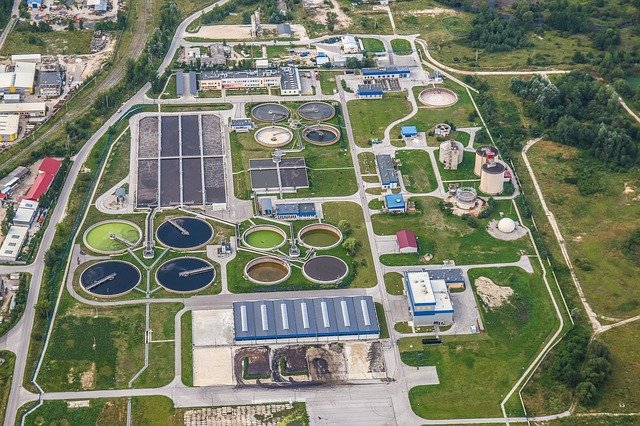Automatic filters for wastewater treatment plants

Automatic filters for wastewater treatment plants
The quality standards for water leaving sewage treatment plants are quite demanding. Despite this, sewage treatment plants can be subject to increases in suspended solids. It is therefore important to secure these installations to ensure that the legal limits are never exceeded. The installation of a filter is therefore crucial and the choice of these filters must be made with care. Hectron filters have many advantages and offer a very good answer to the problem while being inexpensive, easy to maintain and requiring little maintenance.
How does a wastewater treatment plant work?
The main objective of a wastewater treatment plant is to make the collected urban wastewater healthy. This is done before it is discharged into a watercourse, released into the environment or used for other purposes.
When the wastewater arrives at the treatment plant, it undergoes a pre-treatment that consists of a coarse filtering to eliminate large waste (wood, packaging, plastic bags, paper, etc.). This phase can also be used for a first filtration to eliminate heavy matter, sand, but also oils and various greases.
Then, a biological treatment is done in 2 steps. The first one consists in a treatment called “activated sludge” where bacteria degrade the organic matters. The second is a decantation where the sludge will settle in the bottom of a basin, leaving clearer water on the surface. The bottom of the tank is pumped out and the sludge is removed and treated. In most cases, it is then treated to dehydrate it: it can then be used in agriculture.
Of course, many controls are carried out at various stages, particularly on the final water discharged: it must meet very precise standards before being discharged into nature (most often into a river).
What about filtration?
Filtration by automatic filters applies to suspended solids (also called TSS). In addition to the mechanical and biological processes implemented in a treatment plant, it is necessary to eliminate the numerous suspended solids which have very variable sizes and natures.
We can then use for example flocculation which consists in precipitating the matter thanks to the action of some chemical reagents. This process is favorable for some SS but cannot be used too much because of the active ingredients used which must then be eliminated. Centrifugation is generally used for waters with a high TSS content that have a low settling speed. Finally, filtration is an excellent solution for scattered (or few) but small suspended solids. In these cases, it is the most efficient and fastest technique: it is also a back-up or end-of-process technique to ensure the compliance of the discharged water.
Which Hectron automatic filters can be used for filtration in wastewater treatment plants?
AG automatic filters
The AG range of filters can be recommended for wastewater treatment plants.
They have many advantages such as:
- Automatic operation.
- No consumables are required.
- The available filtration thresholds are very fine.
In the Hectron AG range the range of filtration thresholds is wide and covers thresholds from 0.5-1 microns to 500 microns.
The cleaning system is based on a suction ramp and starts when a pressure difference is detected between upstream and downstream. The cleaning is therefore only carried out when needed and avoids excessive water consumption.
There are 4 models in the AG range: AG 100, AG 200, AG 300 and AG 400.
All of them are manufactured on the basis of a stainless steel casing and can withstand a maximum pressure of 5 bar.
The differences between these models are characterized by their flow rate and capacity.
The maximum flow rate for each of the AG automatic filters is as follows:
- AG 100: 8 m3/h.
- AG 200: 45 m3/h.
- AG 300: 120 m3/h.
- AG 400: 340 m3/h.
Finally, the inlet/outlet types and their diameters also differ:
AG 100 : 1” tapped F
AG 200 : 2” F thread, 3” M thread and DN80 flanges
AG 300: 3″ M thread and DN100 and DN150 flanges
AG 400: DN100, DN150, DN200 and DN250 flanges
AS automatic filters
Hectron has a range of automatic low pressure filters which are also suitable for filtration in waste water treatment plants.
This range includes 3 filter models.
They have a wide range of filtration thresholds and are good equipment for the long-term protection of installations.
They are all manufactured with a stainless steel casing and all admit a maximum pressure of 5 bars. Their filtration thresholds range from 6 to 400 microns.
The differences between the AS models lie in their admissible flow rate and in the types of inlet and outlet as well as their diameter.
Thus, the 3 models of AS automatic filters are characterized as follows:
- AS 200: 45 m3/h maximum flow rate and 3″ M thread and 2″ F thread
- AS 300 : 120 m3/h of maximum flow and flanges of DN100 and DN150
- AS 400: 340 m3/h maximum flow rate and flanges of DN150, DN200 and DN250
It should be noted that it is possible to go up to pressures of 10 bar if required (on request) and that all models can be made of 316 L stainless steel.

